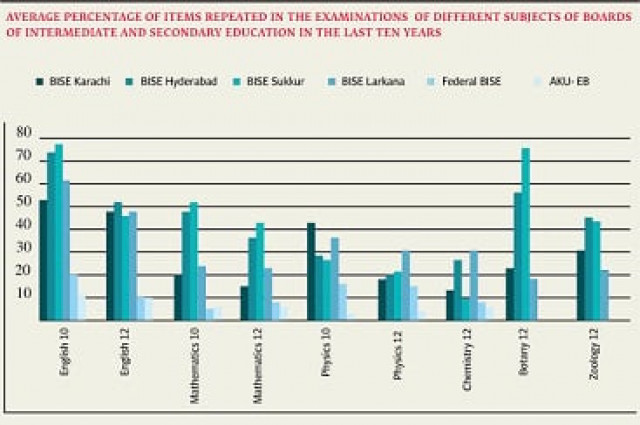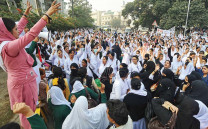All is not well in exam patterns of BISEs in Sindh
Research on patterns of exam papers and their effects on process of school and college education in Sindh

In both these crucial stages in the academic learning process, the significance of one important factor with an overarching impact - the examinations - is seldom discerned. "A research says examinations lead pedagogy," underlined Dr Irfan Ahmed Rind, head of the education department at the Institute of Business Administration, Sukkur.
Dr Rind undertook a research and assessed the examination patterns and trends of the four government boards of intermediate and secondary education as well as the Federal Board of Intermediate and Secondary Education (FBISE) and Aga Khan University - Examination Board (AKU-EB). The research zeroed in on three criteria of the exams, including the levels of learning that is examined through the question papers; the frequency of repetition of the questions; and the trend of prioritising or ignoring certain chapters of the subject books.
More than 108,000 students to appear for BISE exams today
The examination papers of English, mathematics, biology, botany, zoology, physics, and chemistry of grades X and XII from 2006-2015 of the government's BISEs, FBISE and AKU-EB were reviewed. The research analysed, coded and categorised the multiple choice questions (MCQs), constructed response questions (CRQs), and extended response questions (ERQs) in the papers for these subjects.
Regrettably, the question papers of the public boards were found to be below par on all counts.
Learning level
Based on the hierarchic model of classifying learning in six stages of knowledge, comprehension, application, analysis, evaluation and creation, the research appraised how many of these stages factor in the question papers. But, it disappointingly discovered that the fourth, fifth and sixth stages of learning ie, analysis, evaluation and creation, did not feature in almost all board exams during the 10 years.
The first three levels are globally graded as the low order learning and the last three levels as the high order learning, according to cognitive complexities as defined in the Bloom's Taxonomy. "Hence, if the exams promote low order learning or high order learning, the teachers and students would also emphasise accordingly [in the studies]," Dr Rind noted.
80% of Hyderabad’s matric board students declared successful
"These levels of learning are also used by [the] course designers to set benchmarks and students' learning objectives for the specific course. Usually, there is an alignment of students' learning objectives, course material, teachers' teaching strategies and assessment strategies."
The FBISE papers were found to be primarily consisting of the questions assessing the students' knowledge, which is the initial stage in the process, in the 10-year English subject papers for classes X and XII. Similarly, BISE Karachi and BISE Hyderabad's papers had the highest number of comprehension related questions while AKU-EB's papers for the same subject of classes X and XII comprised application related questions.
In the remaining boards, 25% to 40% questions pertained to knowledge, 40% to 50% to comprehension and 1% to 17% to application for class X exams while 29% to 44% to knowledge, 30% to 53% to comprehension and 2% to 18% to application for class XII exams. "There is not a single analytical, evaluative or creative item which can be found in the examination papers of any of the BISEs," he observed.
Even for a subject like mathematics, an overwhelming majority of the questions assessed the first three stages of learning of the students. Hardly, 1% to 12% of the questions in all the board exams were analytical in nature. Only 2% to 6% analysis-based MCQs, CRQs and ERQs were asked from class X students and 1% to 12% from class XII students by the six boards for the subject of physics.
Results are out: 80% students pass BISE exams
For biology, whose exam is only taken by FBISE and AKU-EB, only 3% of the questions concerned the fourth stage as knowledge and comprehension preoccupied focus of the paper makers.
Repetition of questions
The research found BISE Karachi, Hyderabad, Sukkur, and Larkana to have a high percentage of repetition in almost all the subjects, reaching up to 77% in some. Comparatively, FBISE and AKU-EB examination questions were far less repetitive.
During the ten years, BISE Karachi repeated 25% questions, without a change in class X exams of English.
651 students caught cheating in BISE, Mirpurkhas exams
For grades X and XII exams during the ten years, BISE Karachi repeated 52% and 48% questions in english, 21% and 15% in mathematics, 42% and 8% in physics, 32% in zoology and 23% in botany, respectively. Similarly, BISE Hyderabad repeated 75% and 52% in English, 47% and 36% in mathematics, 29% and 19% in physics, 28% in chemistry, 57% in zoology and 45% in botany.
Chapters' priority
Comparatively, the overall repetition in FBISE's exams was found to be between 2% to 15% and 2% to 11% in AKU-EB. "If examination follows a specific pattern by repeating questions for a considerable period, then it is very probable that students follow such patterns and pass examinations without going through the whole syllabus," the research observed.
The research dug out that not only certain questions, but also some chapters are being repeated while others are being ignored. "... some chapters are popular among the examiners and, therefore, items [questions] have frequently been developed from these chapters. Whereas, some chapters have been completely ignored."
Education spending in Sindh
However, the four BISES' in Sindh have been following this trend much more than their federal counterpart and AKU-EB.
For example, 58% of BISE Hyderabad's grade XII zoology paper was prepared in the 10 years from chapters 1, 3 and 6 out of total 13 chapters of the subject. In BISE Sukkur, 48% questions for physics were selected from only three out of the 10-chapter prescribed book. Correspondingly, BISE Karachi also selected 42% of its questions for english for grade X from 6 out 26 chapters.
Implications
According to Dr Rind, the research shows that the examination system at secondary and higher secondary levels in Pakistan failed to prepare students for the tertiary education in universities. "After passing such board exams, when the students reach university level they are unfamiliar with the evaluation and creation skills which are indispensable for higher education," he said while talking to The Express Tribune.
The educationist pointed out a lack of coordination among Board of Curriculum and Extension Wing (BCEW), Sindh Text Book Board (STBB), the education department and the BISEs as a contributing factor to the problem.
Revolutionising education, one government school at a time
The findings also contradict objectives of the National Curriculum, 2009. The curriculum set a high benchmark for the students of grades 9 to 12, expecting to foster high order learning skills of the students.
"But the existing system of examination remains a stumbling block ... not a single item [question] has been included in the examination papers [over the years] to assess students' evaluative and creative skills," he deplored.
The research, an initiative of IBA Sukkur's Vice Chancellor Nisar Ahmed Siddiqi, was started in January, 2016. The next phase of the study will attempt to track the students' learning approaches and the teachers' teaching strategies in the schools affiliated with different BISEs.


















COMMENTS
Comments are moderated and generally will be posted if they are on-topic and not abusive.
For more information, please see our Comments FAQ